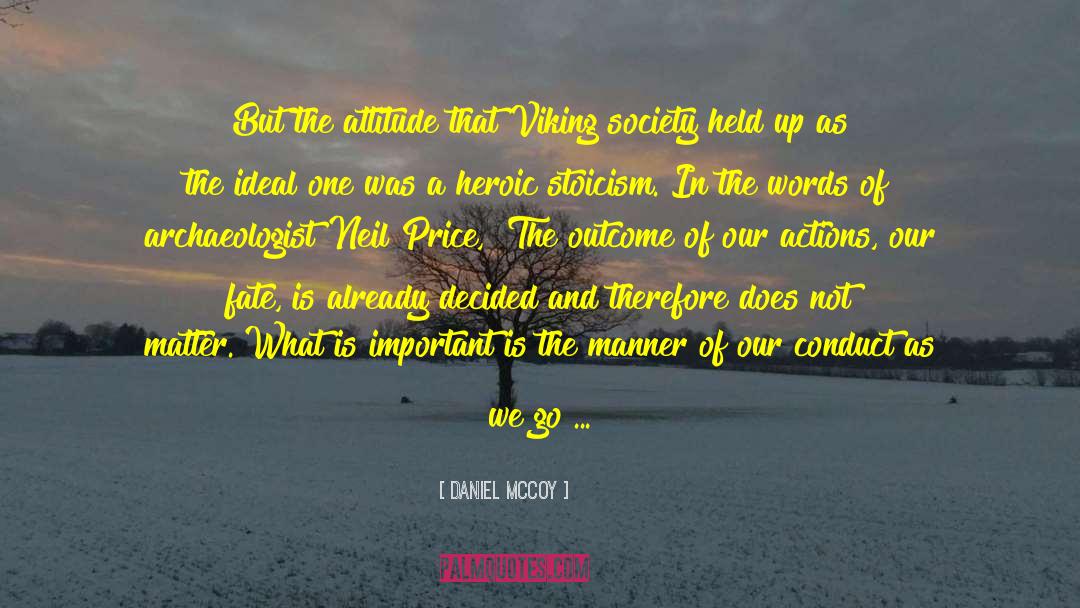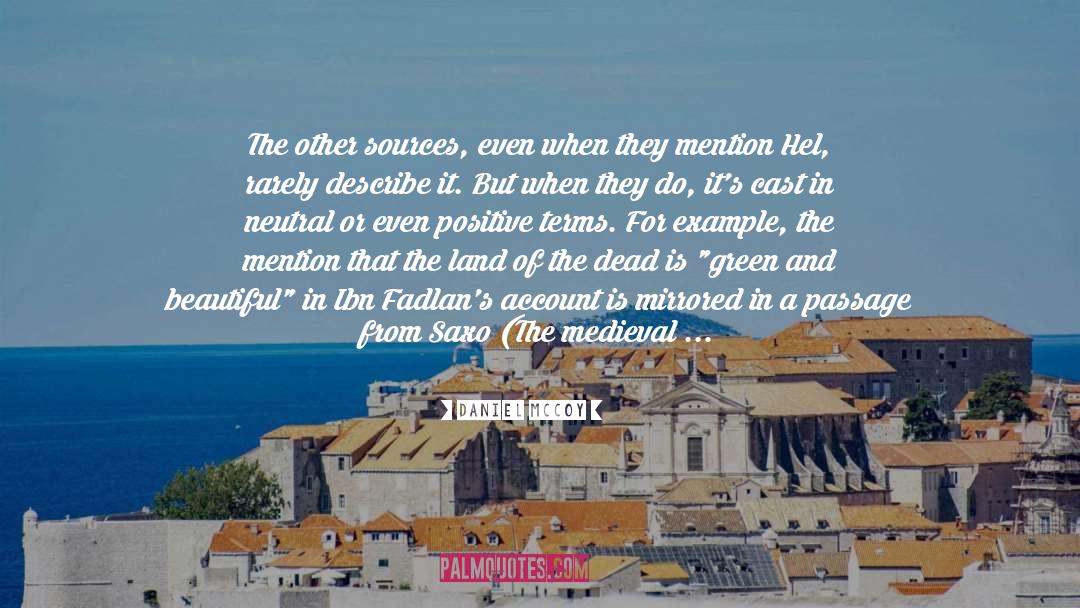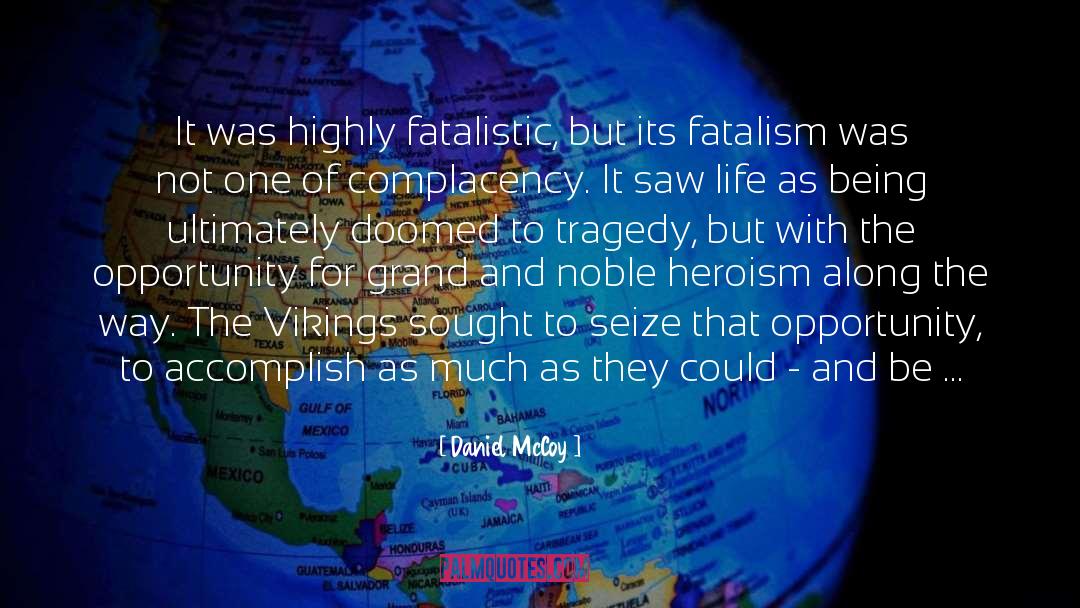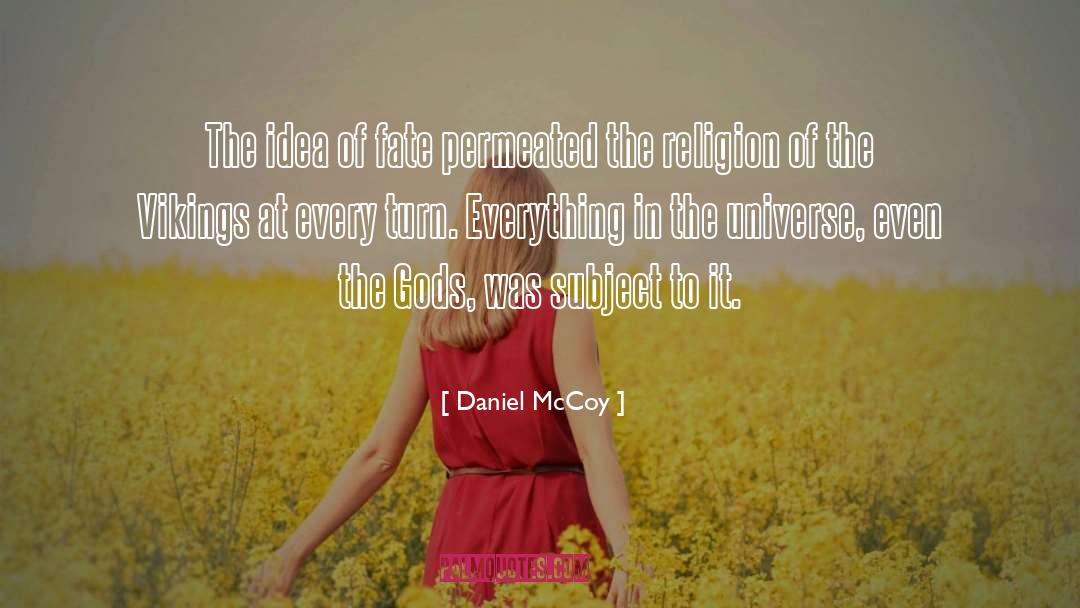Daniel McCoy Famous Quotes
Reading Daniel McCoy quotes, download and share images of famous quotes by Daniel McCoy. Righ click to see or save pictures of Daniel McCoy quotes that you can use as your wallpaper for free.
But the attitude that Viking society held up as the ideal one was a heroic stoicism. In the words of archaeologist Neil Price, "The outcome of our actions, our fate, is already decided and therefore does not matter. What is important is the manner of our conduct as we go to meet it." You couldn't change what was going to happen to you, but you could at least face it with honor and dignity. The best death was to go down fighting, preferably with a smile on your lips. Life is precarious by nature, but this was especially true in the Viking Age, which made this fatalism, and stoicism in the face of it, especially poignant.
The model of this ideal was Odin's amassing an army in Valhalla in preparation for Ragnarok. He knew that Fenrir, "the wolf", was going to murder him one way or another. Perhaps on some level he hoped that by gathering all of the best warriors to fight alongside him, he could prevent the inevitable. But deep down he knew that his struggle was hopeless - yet he determined to struggle just the same, and to die in the most radiant blaze of glory he could muster.

The other sources, even when they mention Hel, rarely describe it. But when they do, it's cast in neutral or even positive terms. For example, the mention that the land of the dead is "green and beautiful" in Ibn Fadlan's account is mirrored in a passage from Saxo (The medieval Danish historian, as you likely recall). In Saxo's telling of the story of Hadding, the hero travels to the "Underworld" and finds a "fair land where green herbs grow when it is winter on earth." His companion even beheads a rooster just outside of that land and flings its carcass over the wall, at which point the bird cries out and comes back to life - a feat which is highly reminiscent of another detail from Ibn Fadlan, namely the beheading of a rooster and a hen whose bodies are then tossed into the dead man's boat shortly before it's set aflame. In both cases, the emphasis is on abundant life in the world of the dead, even when death and absence prevail on earth.

The male sphere of Norse shamanism consisted of the elite warrior groups known as the berserkir ("bear-shirts") and the úlfheðnar ("wolf-skins"). The berserkers (as we'll refer to the members of both of those groups for the sake of convenience), were shamans of a very different sort. After undergoing a period of rigorous training and initiation, they developed the ability to fight in an ecstatic trance that rendered them fearless - and, according to some sources, impervious to danger - while nevertheless inspiring a tremendous amount of fear in their opponents by their behavior, which was
at once animalistic and otherworldly. Perhaps needless to say, there was no ergi associated with being a berserker. Quite the opposite, in fact - the berserker was seen as something of a model of manliness.

It was highly fatalistic, but its fatalism was not one of complacency. It saw life as being ultimately doomed to tragedy, but with the opportunity for grand and noble heroism along the way. The Vikings sought to seize that opportunity, to accomplish as much as they could - and be remembered for it - despite the certainty of the grave and "the wolf." How one met one's fate, whatever that fate happened to be, was what separated honorable and worthy people from the dishonorable and the unworthy. Norse religion and mythology were thoroughly infused with this view. The gods, the "pillars" who held the cosmos together, fought for themselves and their world tirelessly and unflinchingly, even though they knew that in the end the struggle was hopeless, and that the forces Of chaos and entropy would prevail. They went out not with a whimper, but with a bang. This attitude is what made the Vikings the Vikings.

The idea of fate permeated the religion of the Vikings at every turn. Everything in the universe, even the Gods, was subject to it.

